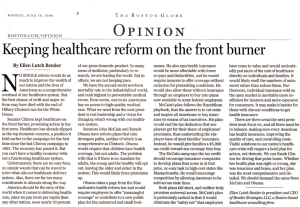Keeping health care reform on the front burner
 NO SINGLE reform would do as much to improve the wealth of our nation and the lives of Americans as a comprehensive overhaul of our health care system. But the best chance of swift and major reform may have died with the end of Hillary Clinton’s run for the White House.
NO SINGLE reform would do as much to improve the wealth of our nation and the lives of Americans as a comprehensive overhaul of our health care system. But the best chance of swift and major reform may have died with the end of Hillary Clinton’s run for the White House.
Senator Clinton kept health care on the front burner, promising action in her first term. Health care has already slipped as the top domestic concern, a position it held earlier in the campaign for the first time since the last Clinton campaign in 1992. The economy has passed it. But you can’t have a healthy economy without a functioning health care system.
Unfortunately, there are no easy fixes, no simple wands that can be waved to solve what ails our health care delivery system. Also, there are far too many constituents to alienate along the way.
America should be the envy of the world when it comes to delivering health care, since we pay more per capita than any other nation, soon nearly 20 percent of our gross domestic product. In many areas of medicine, particularly in research, we are leading the world. But in others, we are not keeping pace.
We have the second-worst newborn mortality rate in the industrialized world, and rank highest in preventable medical errors. Even worse, one in six Americans has no access to high-quality medical care. What we need from the next president is real leadership and a vision for changing what’s wrong with our health care system.
Senators John McCain and Barack Obama have reform plans that take divergent paths, neither of which is as comprehensive as Clinton’s. Obama would require that children have health coverage, but not adults. The problem with that is if there is no mandate for adults, the young and the healthy will opt out, leaving the older and sicker in the system. This would likely force premiums up.
Obama takes a page from the Massachusetts health reform law and would require employers to offer “meaningful coverage” or contribute to a new public plan for the uninsured and small businesses. He also says health insurance would be more affordable with lower co-pays and deductibles, and he would require insurers to offer coverage without exclusion for preexisting conditions. He would also allow those without insurance through an employer to buy into plans now available to some federal employees.
McCain’s plan follows the Republican playbook, that the answer is to cut costs and inspire all Americans to buy insurance by means of tax incentives. His plan would end the tax deduction that employers get for their share of employees’ premiums, thus undercutting the employer base of most families’ insurance. Instead, he would give families a $5,000 tax credit toward any coverage they buy.
The McCain camp says the tax credit should encourage insurance companies to develop plans that come in at that price, no easy task in high-cost states like Massachusetts. He would encourage competition by allowing insurance to be sold across state lines.
Both plans fall short, and neither truly promises universal access. McCain’s plan is particularly radical in that it would eliminate the “safety net” that employees have come to value and would undoubtedly put more of the cost of health care directly on individuals and families. It would likely swell the numbers of uninsured rather than reduce them. Furthermore, individual insurance sold on the open market is inevitably more inefficient for insurers and more expensive for consumers. It may make it harder for those with chronic conditions to get health insurance.
There are three areas the next president must focus on, and all three must be in balance: making sure every American has health insurance, improving the quality of care, and controlling costs. Viable solutions to our nation’s health care crisis will require a bold plan for action, not rhetoric. We can thank Clinton for driving that point home. Whether her health plan was right or wrong, she was tenacious and brave, and her plan was the most comprehensive and detailed. We should demand the same from McCain and Obama.
Ellen Lutch Bender is president and CEO of Bender Strategies LLC, a Boston-based health care consulting firm.
Both plans fall short, and neither truly promises universal access. McCain’s plan is particularly radical in that it would eliminate the “safety net” that employees have come to value and would undoubtedly put more of the cost of health care directly on individuals and families. It would likely swell the numbers of uninsured rather than reduce them. Furthermore, individual insurance sold on the open market is inevitably more inefficient for insurers and more expensive for consumers. It may make it harder for those with chronic conditions to get health insurance.
There are three areas the next president must focus on, and all three must be in balance: making sure every American has health insurance, improving the quality of care, and controlling costs. Viable solutions to our nation’s health care crisis will require a bold plan for action, not rhetoric. We can thank Clinton for driving that point home. Whether her health plan was right or wrong, she was tenacious and brave, and her plan was the most comprehensive and detailed. We should demand the same from McCain and Obama.

